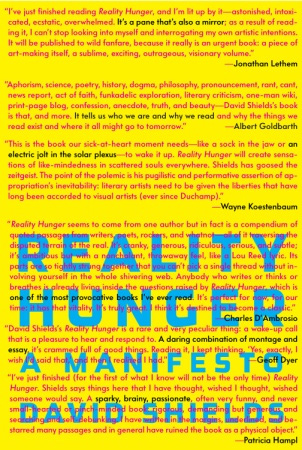 I haven’t finished it yet. But Reality Hunger: A Manifesto by David Shields is making me forget to eat my food. That’s how good it is. I’m sitting there in my local restaurants trying my best to finish my Pasta Siciliana, but I’m staring at my Kindle screen and almost jumping out of my chair with ideas. That’s what this book is for. It was written to light a fire underneath the bottom of an artist.
I haven’t finished it yet. But Reality Hunger: A Manifesto by David Shields is making me forget to eat my food. That’s how good it is. I’m sitting there in my local restaurants trying my best to finish my Pasta Siciliana, but I’m staring at my Kindle screen and almost jumping out of my chair with ideas. That’s what this book is for. It was written to light a fire underneath the bottom of an artist.
Don’t be afraid of stealing. Just do it.
David Shields is a thief and he’s the happiest most energetic thief you’ll ever meet between to covers. All art is theft. We build all our original creations on top of other creations. We consume and then we spit the pieces back out in exploding new arrangements. We appropriate all the time when we incorporate bits of newsprint into paintings, or street sounds into symphonies, or quotes into novels.
Novels. What are they and what do they really do? Do we need or want novels anymore? Fiction? Or do we want the more real? Are we craving more and more reality? It’s on TV everywhere. Can the old form of the novel that describes scenes so well and gets into the characters’ heads really compete with all the new forms coming to life that are built primarily upon reality?
What is reality? Whose reality? Isn’t one’s perception of a simple street scene actually fiction once it passes through the subjective filter? Isn’t everything ultimately fiction?
Shields’s book is composed of many fragments mostly snatched from other people throughout history. Shields leaves his own remarks unannounced until the back of the book where he finally credits his sources. The point is to connect thoughts from all over the world through many ages to gradually build up a central argument or ‘manifesto’ for a modern art or literature that eliminates the guilt from borrowing or ‘stealing.’ The ideas are obviously not all new, otherwise there would be no fragments to put in the book. But the expression of the ideas in this way is new. Reality Hunger is a jolt and it will offend as many or more people than it inspires.
Several years ago Bob Dylan got into hot water for using a phrase from a relatively unknown novel. Sure enough, Dylan’s phrase did match the novelist’s. Outrage ensued. When the novelist was asked about his feelings he stated that if Bob Dylan wanted to use one of his phrases he was simply honored.
This book is very timely in a world where people are getting into lawsuits because some artist’s sculpture appears in a street photo. We’ve been waiting for this book. Fortunately, Mr. Shields is as excited about this book as his readers are – those who aren’t outraged anyway. He comes off as a very energetic and enthusiastic partner to the artist. I admire this book a great deal and will most likely be referring to bits and pieces of it for many years – and stealing them.